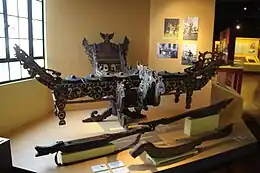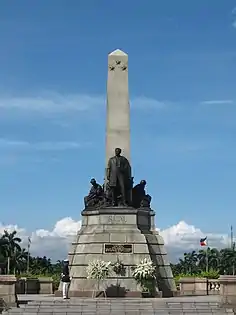Pambansang Museo ng Antropolohiya | |
_(2014)_a0001.JPG.webp) | |
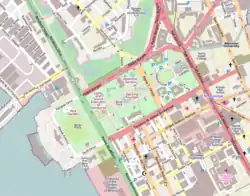 Location within Rizal Park _location_map.svg.png.webp) National Museum of Anthropology (Manila) (Manila) .svg.png.webp) National Museum of Anthropology (Manila) (Philippines) | |
| Coordinates | 14°35′07″N 120°58′51″E / 14.58528°N 120.98083°E |
|---|---|
| Type | Anthropology museum |
| Public transit access | |
| National Museum of the Philippines | |
The National Museum of Anthropology (Filipino: Pambansang Museo ng Antropolohiya), formerly known as the Museum of the Filipino People (Filipino: Museo ng Lahing Filipino), is a component museum of the National Museum of the Philippines which houses Ethnological and Archaeological exhibitions. It is located in the Agrifina Circle, Rizal Park, Manila adjacent to the National Museum of Fine Arts building.
Built c. 1916–1918 from a neoclassical design by Canadian-American architect Ralph Harrington Doane when he was consulting architect to the Philippine government,[1] the building formerly housed the Department of Finance.[2] It also houses the wreck of the San Diego, ancient artifacts, and zoology divisions.
Current galleries and offices
Ground floor
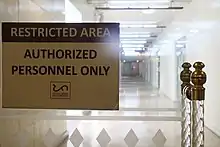
Hallway leading to the offices
- Ifugao House / Courtyard
- Office of the Exhibition, Editorial, and Media Production Services Division
- Office of the Museum Foundation of the Philippines
- Office of the Archaeology Division
- Office of the Ethnology Division
- Office of the Maritime and Underwater Cultural Heritage Division
- National Museum Library
Second floor
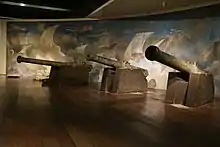
The San Diego: 500 Years of Maritime Trade Gallery
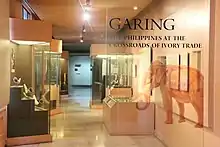
Garing: The Philippines at the Crossroads of Ivory Trade Gallery
- Marble Hall
- The San Diego: 500 Years of Maritime Trade
- Garing: The Philippines at the Crossroads of Ivory Trade
Third floor
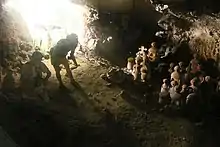
A diorama of the discovery of burial jars displayed at the "Kaban ng Lahi" Gallery
- Lantaka: Of War and Peace
- Manlilikha ng Bayan Hall (National Living Treasure)
- Lumad: Mindanao
- Faith, Tradition and Place: Bangsamoro Art from the National Ethnographic Collection
- Kaban ng Lahi (Archaeological Treasures)
- Biyay: Traditional Ecological Knowledge among Philippine Negrito Communities
- Anito: Beliefs, Traditions and the Afterlife in Northern Luzon
Fourth floor
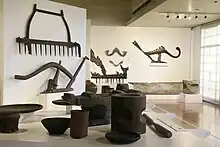
Rice, Biodiversity and Climate Change Gallery
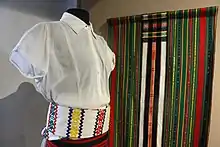
One of the textiles exhibited at the "Hibla ng Lahing Filipino" Gallery
- Reception Hall (Changing Gallery)
- Rice, Biodiversity and Climate Change
- Hibla ng Lahing Filipino: The Artistry of Philippine Textiles
- Baybayin: Ancient and Traditional Scripts of the Philippines
- Entwined Spheres: Mats and Baskets as Containers, Costumes and Conveyors
- Office of the Museum Services Division
Fifth floor
- National Ethnographic Collection Repositories
_(2014)_a0001.JPG.webp) Facade of the National Museum of Anthropology in 2014.
Facade of the National Museum of Anthropology in 2014.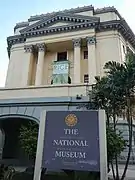 Facade of the Museum of the Filipino People (before renovation).
Facade of the Museum of the Filipino People (before renovation).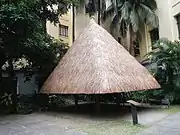 A model of an Ifugao house in the courtyard of the building.
A model of an Ifugao house in the courtyard of the building.
See also
References
- ↑ "Ralph Harrington Doane," BackBayHouses.org
- ↑ Villalon, A. (January 30, 2017). "At long last, Manila now has a museum precinct/complex". Philippine Daily Inquirer. Retrieved January 30, 2017.
External links
- National Museum: Museum of the Filipino People
- Museum of the Filipino People: Home to the Anthropology and Archaeology Divisions of the National Museum of the Philippines
Wikimedia Commons has media related to National Museum of Anthropology (Manila).
This article is issued from Wikipedia. The text is licensed under Creative Commons - Attribution - Sharealike. Additional terms may apply for the media files.
